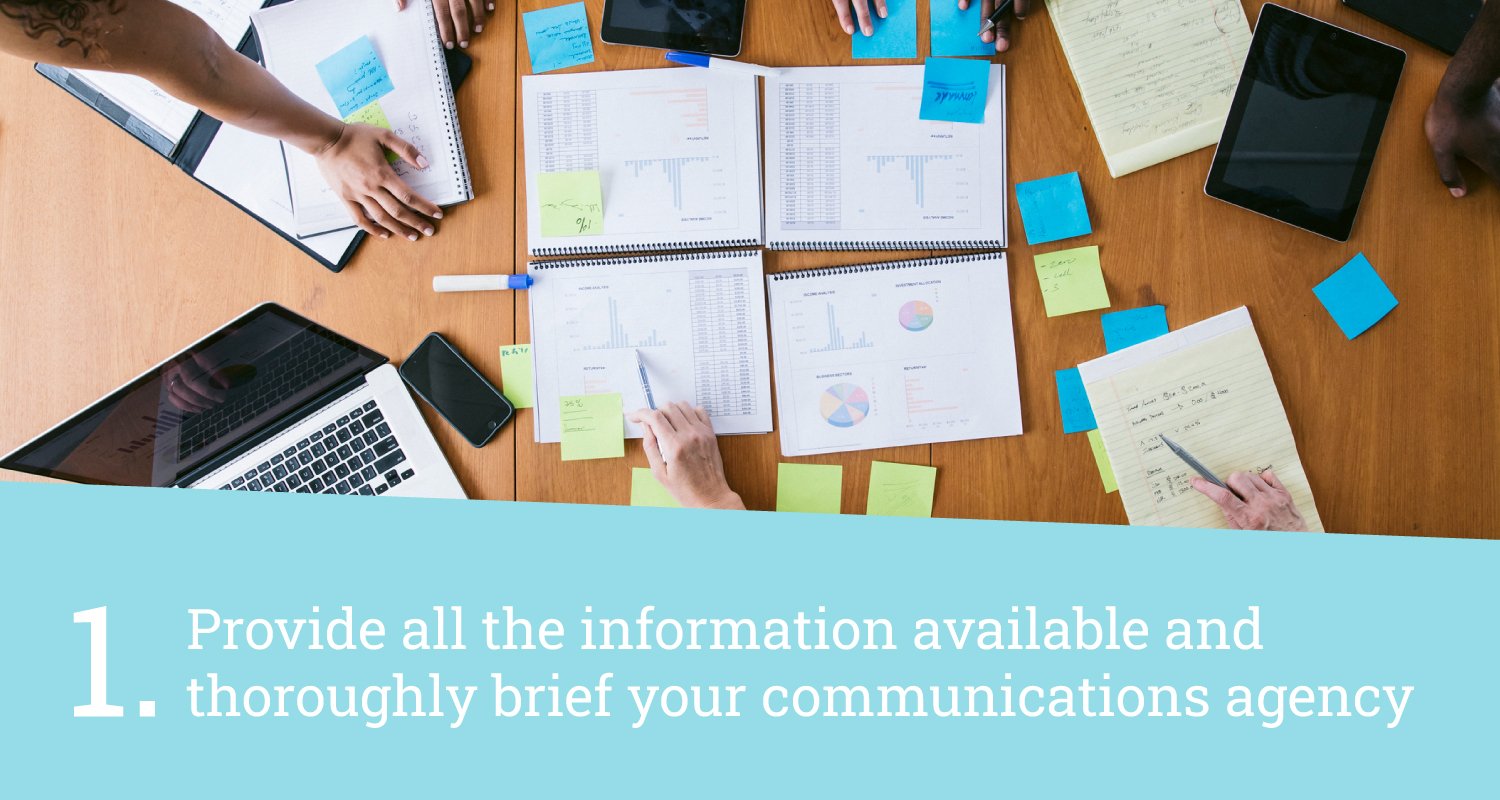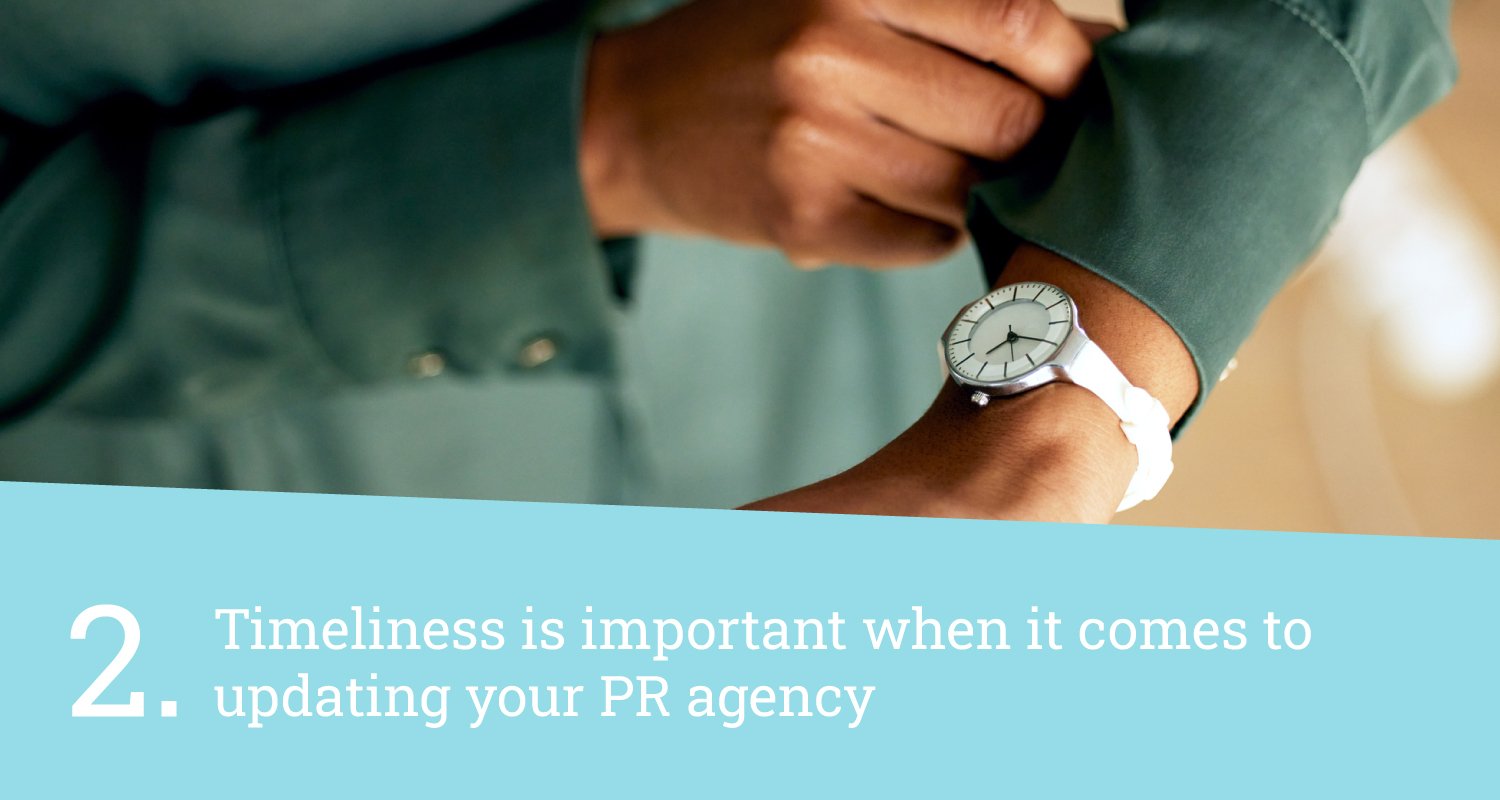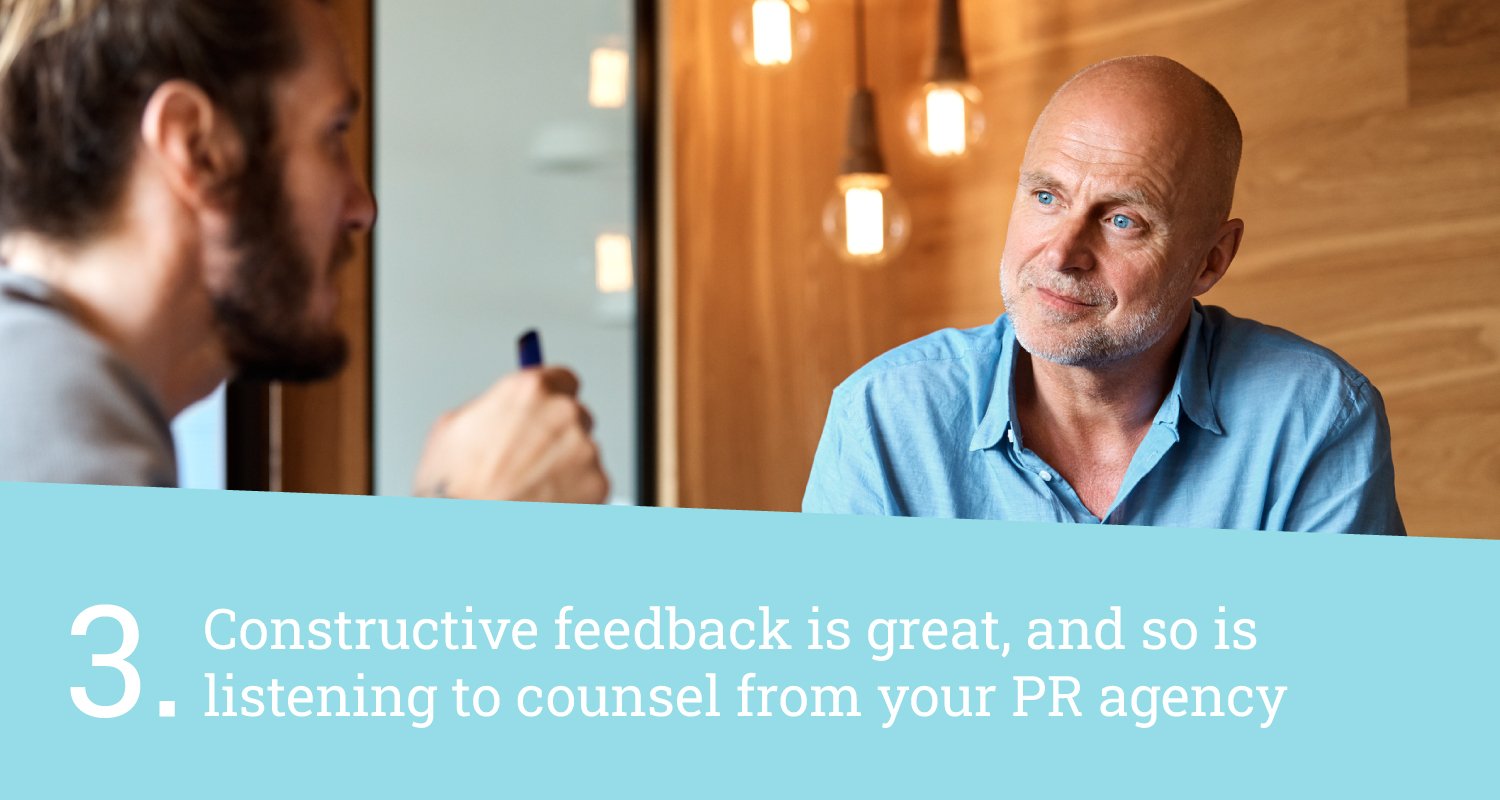Length: 13-minute read.
Quick Summary: A public relations (PR) agency is there to support your business growth, but success depends on a few factors. This article outlines the importance of a strong relationship with your communications agency, and how to make sure you’re getting the most value from the collaboration.
Are you using your public relations agency to its full potential?

Part of growing a thriving business is taking advantage of public relations (PR) and using it to establish your organisation, products, and services in the market, as well as your spokespeople as industry thought leaders. In theory, this may seem straightforward for your internal communication teams. However, successfully implementing PR is actually more involved than it appears, and needs time, careful consideration and planning, and strategies that align with the goals of the business.
This is where a dedicated public relations agency can help. However, not all PR agencies are created equal, and choosing the right agency for your business is crucial to getting results. While generalist agencies can sometimes talk the talk, when it comes time to demonstrate results, the outcomes can often be disappointing. This is because public relations isn’t a one-size-fits-all proposition. If you’re an organisation in the built environment or consumer technology sector, for example, your PR needs will be far different from those of an organisation selling fast-moving consumer goods (FMCG).
Consider a consumer technology brand. Working with a generalist agency may yield some initial results for them; however, these agencies don’t tend to have a deep well of industry-specific knowledge to tap into. They also usually don’t have strong and trusted relationships with sector-specific media, and they can struggle to articulate your business’s key messages in a way that truly resonates with your target audience. By contrast, consumer technology PR agencies are genuine experts in your field. They spend all of their time working in your space and engaging with relevant media, so they know how to get results for your business.
It can be tempting for organisations to manage PR in house. However, in Write Away’s experience, most in-house attempts at PR tend to fall short for a number of reasons. Chief among these is often resourcing. Effective PR campaigns require a significant amount of knowledge, smart systems and processes underpinning activities, and, preferably, a team of people to ensure that journalists’ enquiries are always fielded in a timely manner, regardless of people’s annual leave or sick days. Aside from their superior expertise, the benefits of using a dedicated consumer technology PR agency means they can also leverage extensive databases, understand the operations behind relevant publications, and capitalise on pre-existing relationships with journalists, something that in-house teams can’t always do.
A PR agency takes the pressure off internal communication teams and, when used well, can work as an extension of your business and marketing strategy.
Why a strong relationship with your PR agency is important
Building a strong relationship with your PR team is the foundation of success for PR efforts. By taking the time and putting in the work to build a solid rapport with your communications agency, the team will understand you and your business better, including your goals, processes, products and services, and audience, as well as provide proactive ideas, opportunities, and PR strategies that go above and beyond what’s typical.
There are three key factors that influence a strong relationship between your business and its communications agency:
- That you know and understand, or at least feel comfortable with, what PR is and how it works.
- Defining and agreeing on clear expectations, roles, and responsibilities at the start of the relationship.
- Providing frequent communication and updates through open dialogue between the PR team and your business.
The capacity for a communications agency to deliver successful campaigns hinges on the communication between your organisation and the agency, and a clear understanding of what success means to your company. It may be worth reviewing what your business has done previously in relation to PR efforts, what it is currently doing, and any strategies that really worked for the organisation.
Once the agency understands where the business has been, it can start working to get you to where you want to go. What do you want to achieve with PR? Is there a short- or long-term goal to work towards? Work with your agency to set realistic, measurable objectives to ensure everyone is working towards a clear and mutually agreed goal.
After selecting the right consumer technology PR agency, the work doesn’t finish there; a truly successful strategy requires your ongoing, active participation. And, just like with any other business partner, you get out what you put in.
So, how can you get the most out of your PR agency?
Below are the five factors that influence this.
1. Provide all the information available and thoroughly brief your agency

Your PR agency should essentially work as an extension of your company. However, your PR team is only as good as the information they’re given. Your job here is to provide all information available, which may include brochures, briefing documents, images, and other internal collateral, to provide the team with a clearer picture of the ins and outs of your company, and its products and services.
The more deeply your corporate communications specialists understand your business, the better they can develop an effective PR strategy, media opportunities, and stories that are tailored to fit your audience and build your profile.
Some of the important things to share with your PR team include:
- internal, confidential information
- customer-facing news
- the launch of new products or services
- new customer and partnership wins
- events your business is attending or sponsoring
- big and/or new announcements or updates for the business.
When your agency knows what’s on the horizon, it can prepare appropriately and give you the best possible advice. Public relations agencies would never divulge commercially sensitive information and will happily sign a non-disclosure agreement (NDA) if requested.
2. Timeliness is important when it comes to updating your PR agency

Like any successful project, PR campaigns require strategy and planning. Updating your PR team about an important announcement or product launch a couple of days out will not yield you the best results, if any at all. Instead, it’s likely to fall flat against your expectations or those of other business stakeholders, and result in a strained relationship between you and your PR agency.
Providing adequate lead time for non-urgent announcements will mean that your PR team can carefully craft a great pitch, tailor it to each media outlet, and strategically time it to generate the most traction.
Likewise, you also need your company contact and spokesperson to be readily available for urgent approvals or requests and interviews respectively. Journalists work on tight deadlines and accommodating their last-minute requests can often mean your spokespeople become trusted sources and your company a go-to for industry commentary or insights.
Read our blog to learn more about how to ensure media interviews are a success.
3. Constructive feedback is great, and so is listening to counsel from your PR agency

Communication and honesty are two essential qualities needed in your relationship with your PR agency, and even extending to the media. If you aren’t satisfied with the results your PR team has achieved, or if there is an issue, then it’s important to have a discussion with your agency right away.
Consider: what was it exactly that left you unsatisfied and why? Is the issue around media uptake on a particular tactic, or is it something that needs to be addressed in the strategy? Any top PR agency in Australia should have no problems discussing the issue, no matter how unpleasant the feedback may be. By addressing problems right away, the PR team can pivot to take the feedback on board, and work with you to find a solution that everyone is happy with.
Likewise, if you are happy with a particular activity or received great feedback on it from business, sharing this with your team boosts morale and enthusiasm.
And, it’s equally important to listen to and trust your team when they provide you with counsel. You hired an expert consumer technology PR agency, which means you can benefit from the fact that they may look at a situation differently and offer advice you might not have expected, especially in a crisis.
Be open to hearing this. Your communications agency has a plethora of experience in the industry, as well as valuable media knowledge. Although you may ultimately choose not to follow their advice, your PR team has the best interests of your business at heart when providing recommendations.
4. Take advantage of all services your communications agency offers

The right PR agency should be able to help you with more than just PR.
Savvy PR agencies have moved well beyond traditional media relations and often offer an array of additional services to provide an integrated approach to your communications strategy. Centralising communications through your agency, and taking advantage of these additional services, can not only ensure that your organisation is delivering one coherent message in its PR and media efforts, but also relieve some of the pressure on your internal teams.
Some of these additional services may include:
- copywriting and content writing
- content marketing
- case studies
- crisis management
- advertising
5. Be realistic with expectations and deliverables

As we mentioned, at the beginning of the relationship with your PR agency it’s important to define what success will look like when it comes to your PR efforts. Part of this is setting realistic expectations.
When it comes to expectations around media, it’s essential to understand that there are many factors that come into play when a business is featured in Better Homes and Gardens or across the online and print editions of The Australian.
These factors may include, but are certainly not limited to: the type of business yours is and where it sits in the market; what news, products, or insights you have to offer; how juicy or interesting the story is; the spokesperson or spokespeople offered; the current appetite for your topic; and the news cycle at that time. Images are equally important for many key publications, and access to a visual story component is essential when it comes to television opportunities.
As a top PR agency in Australia, Write Away Communication can help your business to take advantage of the value PR provides. The team at Write Away Communication specialises in communication programs for clients in the built environment and homewares industries, and are experts at media relations that drive results.
Find out how we can ensure your business gets the most value out of your agency, read our whitepaper or contact us today.











